Examining the Ethics of Advertising Unhealthy Food to Children
VerifiedAdded on 2023/06/10
|8
|2348
|198
Essay
AI Summary
This essay explores the ethical implications of advertising unhealthy foods to children, arguing that it promotes unhealthy lifestyles and contributes to addiction and health problems. It highlights the negative impact of fast food and junk food advertisements on children's eating habits and academic performance. The essay contrasts this with the potential benefits of advertising healthy food choices and discusses the responsibilities of parents, schools, and advertisers in shaping children's food preferences. It concludes that banning advertisements of unhealthy foods is the best solution to protect children's health and future, while also acknowledging the need for clear guidelines on what constitutes 'acceptable' foods for advertising and the importance of parental guidance.
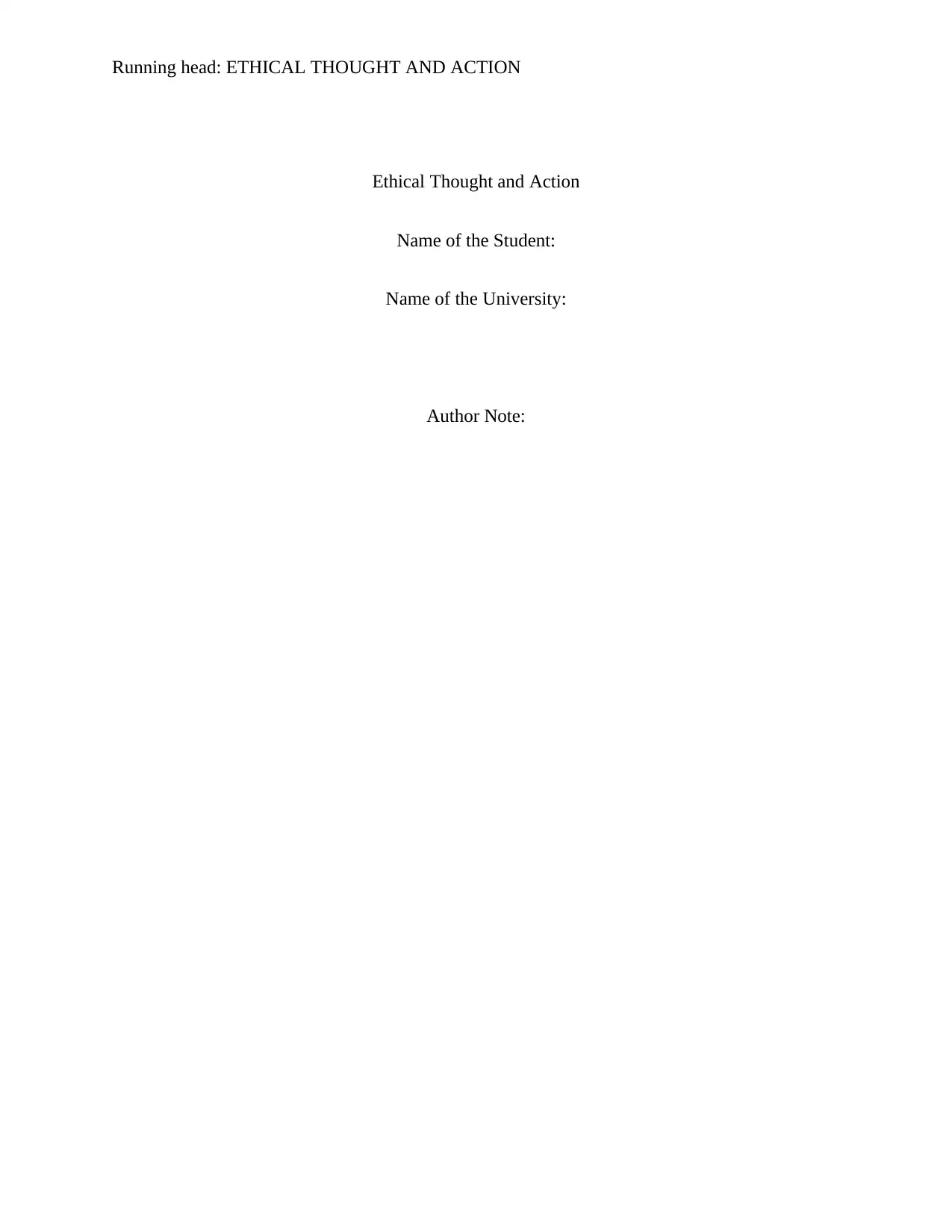
Running head: ETHICAL THOUGHT AND ACTION
Ethical Thought and Action
Name of the Student:
Name of the University:
Author Note:
Ethical Thought and Action
Name of the Student:
Name of the University:
Author Note:
Paraphrase This Document
Need a fresh take? Get an instant paraphrase of this document with our AI Paraphraser
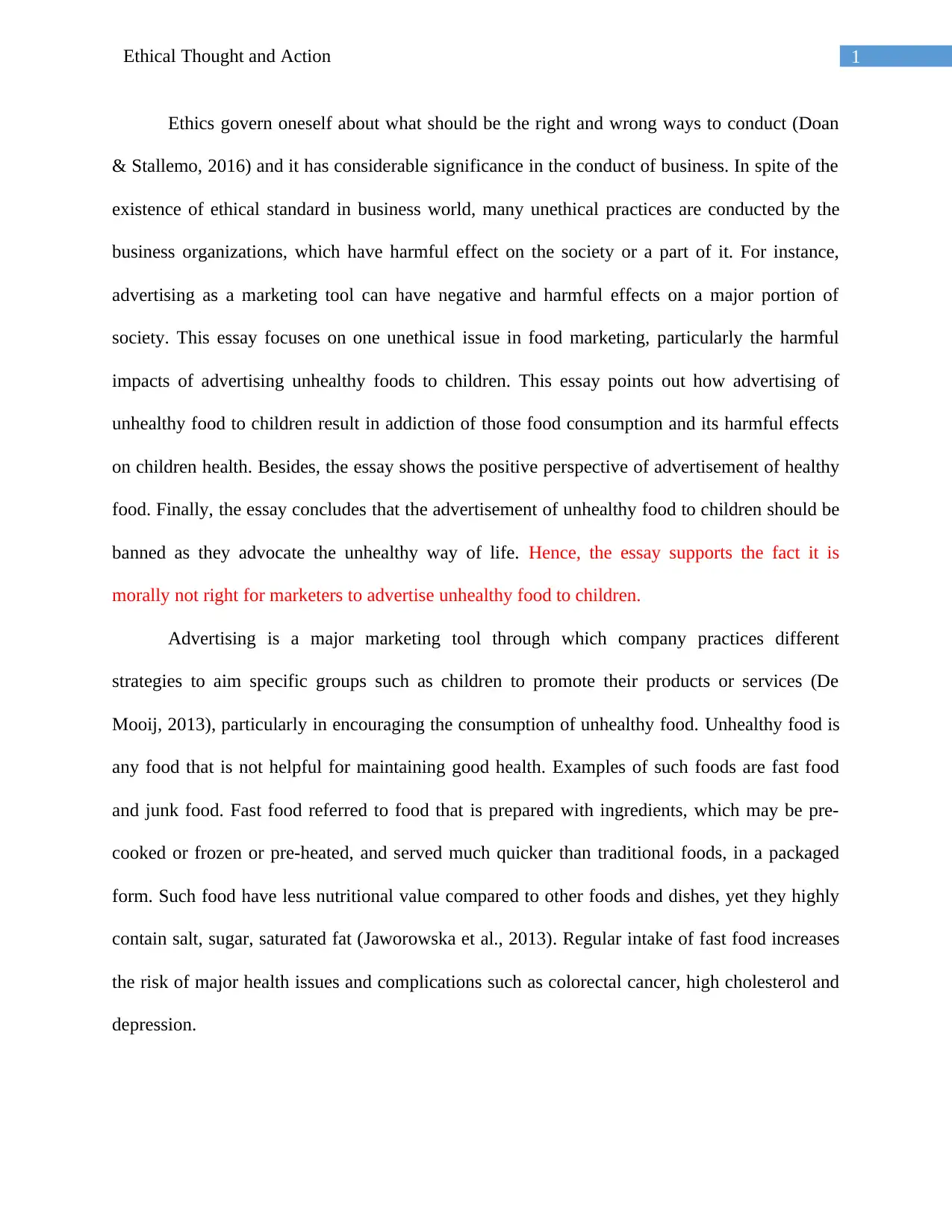
1Ethical Thought and Action
Ethics govern oneself about what should be the right and wrong ways to conduct (Doan
& Stallemo, 2016) and it has considerable significance in the conduct of business. In spite of the
existence of ethical standard in business world, many unethical practices are conducted by the
business organizations, which have harmful effect on the society or a part of it. For instance,
advertising as a marketing tool can have negative and harmful effects on a major portion of
society. This essay focuses on one unethical issue in food marketing, particularly the harmful
impacts of advertising unhealthy foods to children. This essay points out how advertising of
unhealthy food to children result in addiction of those food consumption and its harmful effects
on children health. Besides, the essay shows the positive perspective of advertisement of healthy
food. Finally, the essay concludes that the advertisement of unhealthy food to children should be
banned as they advocate the unhealthy way of life. Hence, the essay supports the fact it is
morally not right for marketers to advertise unhealthy food to children.
Advertising is a major marketing tool through which company practices different
strategies to aim specific groups such as children to promote their products or services (De
Mooij, 2013), particularly in encouraging the consumption of unhealthy food. Unhealthy food is
any food that is not helpful for maintaining good health. Examples of such foods are fast food
and junk food. Fast food referred to food that is prepared with ingredients, which may be pre-
cooked or frozen or pre-heated, and served much quicker than traditional foods, in a packaged
form. Such food have less nutritional value compared to other foods and dishes, yet they highly
contain salt, sugar, saturated fat (Jaworowska et al., 2013). Regular intake of fast food increases
the risk of major health issues and complications such as colorectal cancer, high cholesterol and
depression.
Ethics govern oneself about what should be the right and wrong ways to conduct (Doan
& Stallemo, 2016) and it has considerable significance in the conduct of business. In spite of the
existence of ethical standard in business world, many unethical practices are conducted by the
business organizations, which have harmful effect on the society or a part of it. For instance,
advertising as a marketing tool can have negative and harmful effects on a major portion of
society. This essay focuses on one unethical issue in food marketing, particularly the harmful
impacts of advertising unhealthy foods to children. This essay points out how advertising of
unhealthy food to children result in addiction of those food consumption and its harmful effects
on children health. Besides, the essay shows the positive perspective of advertisement of healthy
food. Finally, the essay concludes that the advertisement of unhealthy food to children should be
banned as they advocate the unhealthy way of life. Hence, the essay supports the fact it is
morally not right for marketers to advertise unhealthy food to children.
Advertising is a major marketing tool through which company practices different
strategies to aim specific groups such as children to promote their products or services (De
Mooij, 2013), particularly in encouraging the consumption of unhealthy food. Unhealthy food is
any food that is not helpful for maintaining good health. Examples of such foods are fast food
and junk food. Fast food referred to food that is prepared with ingredients, which may be pre-
cooked or frozen or pre-heated, and served much quicker than traditional foods, in a packaged
form. Such food have less nutritional value compared to other foods and dishes, yet they highly
contain salt, sugar, saturated fat (Jaworowska et al., 2013). Regular intake of fast food increases
the risk of major health issues and complications such as colorectal cancer, high cholesterol and
depression.
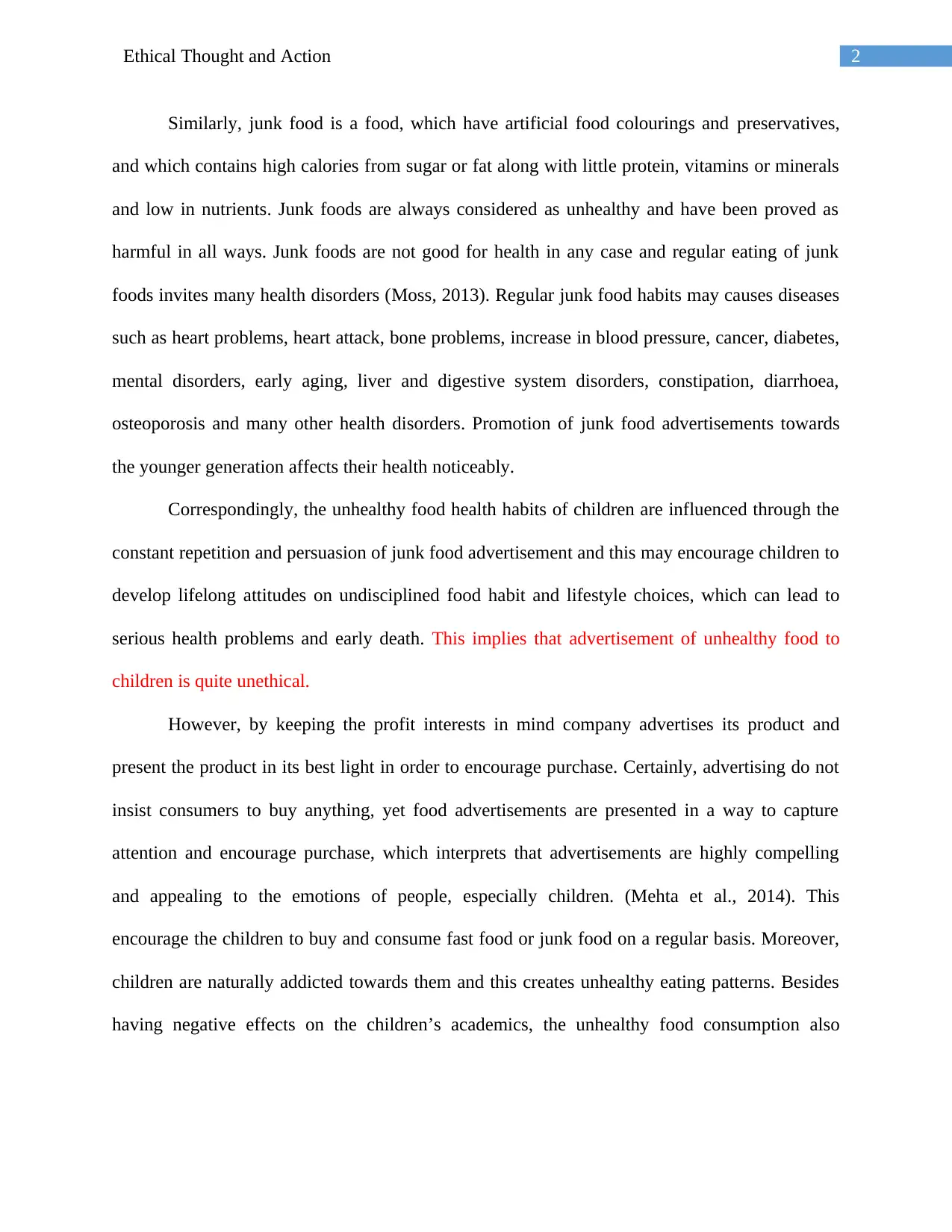
2Ethical Thought and Action
Similarly, junk food is a food, which have artificial food colourings and preservatives,
and which contains high calories from sugar or fat along with little protein, vitamins or minerals
and low in nutrients. Junk foods are always considered as unhealthy and have been proved as
harmful in all ways. Junk foods are not good for health in any case and regular eating of junk
foods invites many health disorders (Moss, 2013). Regular junk food habits may causes diseases
such as heart problems, heart attack, bone problems, increase in blood pressure, cancer, diabetes,
mental disorders, early aging, liver and digestive system disorders, constipation, diarrhoea,
osteoporosis and many other health disorders. Promotion of junk food advertisements towards
the younger generation affects their health noticeably.
Correspondingly, the unhealthy food health habits of children are influenced through the
constant repetition and persuasion of junk food advertisement and this may encourage children to
develop lifelong attitudes on undisciplined food habit and lifestyle choices, which can lead to
serious health problems and early death. This implies that advertisement of unhealthy food to
children is quite unethical.
However, by keeping the profit interests in mind company advertises its product and
present the product in its best light in order to encourage purchase. Certainly, advertising do not
insist consumers to buy anything, yet food advertisements are presented in a way to capture
attention and encourage purchase, which interprets that advertisements are highly compelling
and appealing to the emotions of people, especially children. (Mehta et al., 2014). This
encourage the children to buy and consume fast food or junk food on a regular basis. Moreover,
children are naturally addicted towards them and this creates unhealthy eating patterns. Besides
having negative effects on the children’s academics, the unhealthy food consumption also
Similarly, junk food is a food, which have artificial food colourings and preservatives,
and which contains high calories from sugar or fat along with little protein, vitamins or minerals
and low in nutrients. Junk foods are always considered as unhealthy and have been proved as
harmful in all ways. Junk foods are not good for health in any case and regular eating of junk
foods invites many health disorders (Moss, 2013). Regular junk food habits may causes diseases
such as heart problems, heart attack, bone problems, increase in blood pressure, cancer, diabetes,
mental disorders, early aging, liver and digestive system disorders, constipation, diarrhoea,
osteoporosis and many other health disorders. Promotion of junk food advertisements towards
the younger generation affects their health noticeably.
Correspondingly, the unhealthy food health habits of children are influenced through the
constant repetition and persuasion of junk food advertisement and this may encourage children to
develop lifelong attitudes on undisciplined food habit and lifestyle choices, which can lead to
serious health problems and early death. This implies that advertisement of unhealthy food to
children is quite unethical.
However, by keeping the profit interests in mind company advertises its product and
present the product in its best light in order to encourage purchase. Certainly, advertising do not
insist consumers to buy anything, yet food advertisements are presented in a way to capture
attention and encourage purchase, which interprets that advertisements are highly compelling
and appealing to the emotions of people, especially children. (Mehta et al., 2014). This
encourage the children to buy and consume fast food or junk food on a regular basis. Moreover,
children are naturally addicted towards them and this creates unhealthy eating patterns. Besides
having negative effects on the children’s academics, the unhealthy food consumption also
⊘ This is a preview!⊘
Do you want full access?
Subscribe today to unlock all pages.

Trusted by 1+ million students worldwide
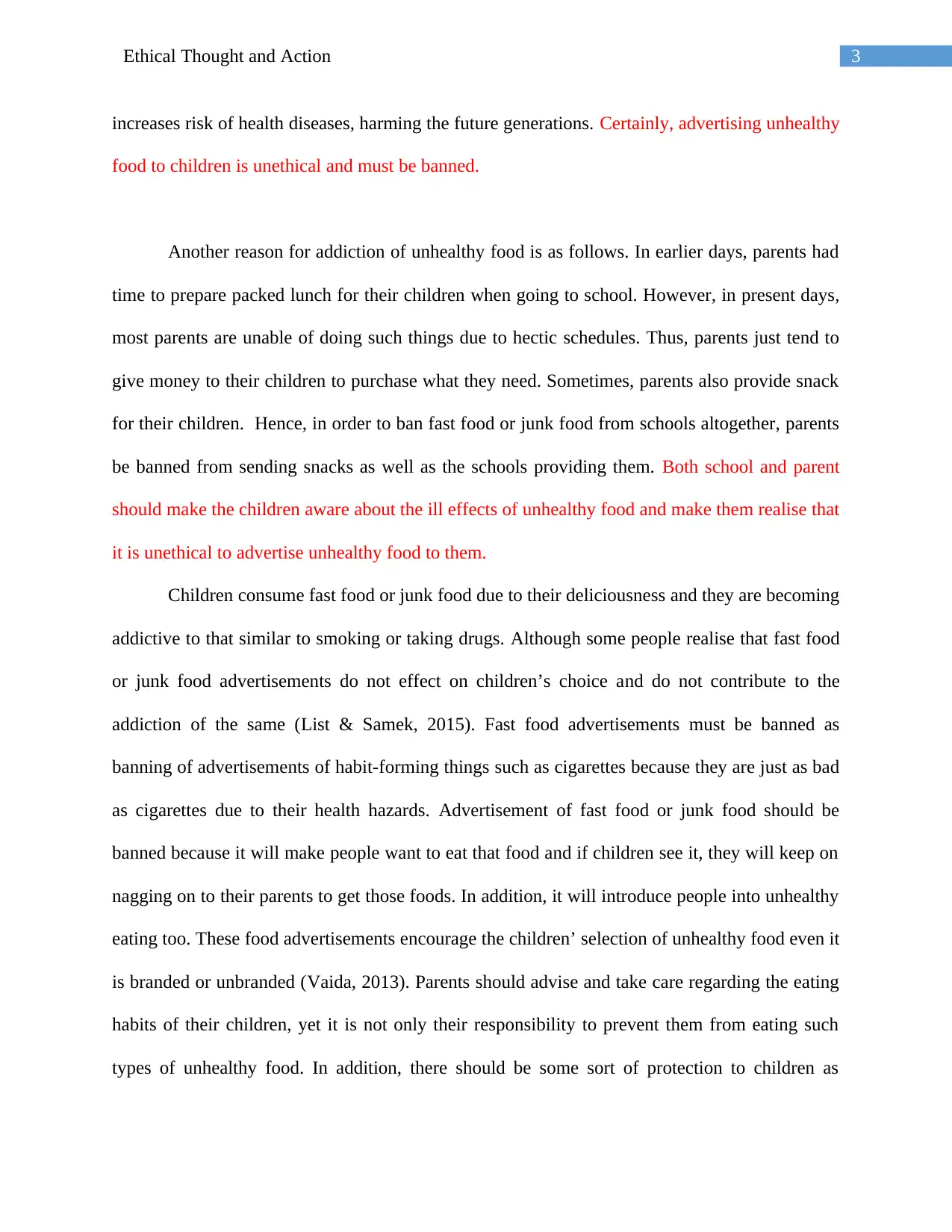
3Ethical Thought and Action
increases risk of health diseases, harming the future generations. Certainly, advertising unhealthy
food to children is unethical and must be banned.
Another reason for addiction of unhealthy food is as follows. In earlier days, parents had
time to prepare packed lunch for their children when going to school. However, in present days,
most parents are unable of doing such things due to hectic schedules. Thus, parents just tend to
give money to their children to purchase what they need. Sometimes, parents also provide snack
for their children. Hence, in order to ban fast food or junk food from schools altogether, parents
be banned from sending snacks as well as the schools providing them. Both school and parent
should make the children aware about the ill effects of unhealthy food and make them realise that
it is unethical to advertise unhealthy food to them.
Children consume fast food or junk food due to their deliciousness and they are becoming
addictive to that similar to smoking or taking drugs. Although some people realise that fast food
or junk food advertisements do not effect on children’s choice and do not contribute to the
addiction of the same (List & Samek, 2015). Fast food advertisements must be banned as
banning of advertisements of habit-forming things such as cigarettes because they are just as bad
as cigarettes due to their health hazards. Advertisement of fast food or junk food should be
banned because it will make people want to eat that food and if children see it, they will keep on
nagging on to their parents to get those foods. In addition, it will introduce people into unhealthy
eating too. These food advertisements encourage the children’ selection of unhealthy food even it
is branded or unbranded (Vaida, 2013). Parents should advise and take care regarding the eating
habits of their children, yet it is not only their responsibility to prevent them from eating such
types of unhealthy food. In addition, there should be some sort of protection to children as
increases risk of health diseases, harming the future generations. Certainly, advertising unhealthy
food to children is unethical and must be banned.
Another reason for addiction of unhealthy food is as follows. In earlier days, parents had
time to prepare packed lunch for their children when going to school. However, in present days,
most parents are unable of doing such things due to hectic schedules. Thus, parents just tend to
give money to their children to purchase what they need. Sometimes, parents also provide snack
for their children. Hence, in order to ban fast food or junk food from schools altogether, parents
be banned from sending snacks as well as the schools providing them. Both school and parent
should make the children aware about the ill effects of unhealthy food and make them realise that
it is unethical to advertise unhealthy food to them.
Children consume fast food or junk food due to their deliciousness and they are becoming
addictive to that similar to smoking or taking drugs. Although some people realise that fast food
or junk food advertisements do not effect on children’s choice and do not contribute to the
addiction of the same (List & Samek, 2015). Fast food advertisements must be banned as
banning of advertisements of habit-forming things such as cigarettes because they are just as bad
as cigarettes due to their health hazards. Advertisement of fast food or junk food should be
banned because it will make people want to eat that food and if children see it, they will keep on
nagging on to their parents to get those foods. In addition, it will introduce people into unhealthy
eating too. These food advertisements encourage the children’ selection of unhealthy food even it
is branded or unbranded (Vaida, 2013). Parents should advise and take care regarding the eating
habits of their children, yet it is not only their responsibility to prevent them from eating such
types of unhealthy food. In addition, there should be some sort of protection to children as
Paraphrase This Document
Need a fresh take? Get an instant paraphrase of this document with our AI Paraphraser
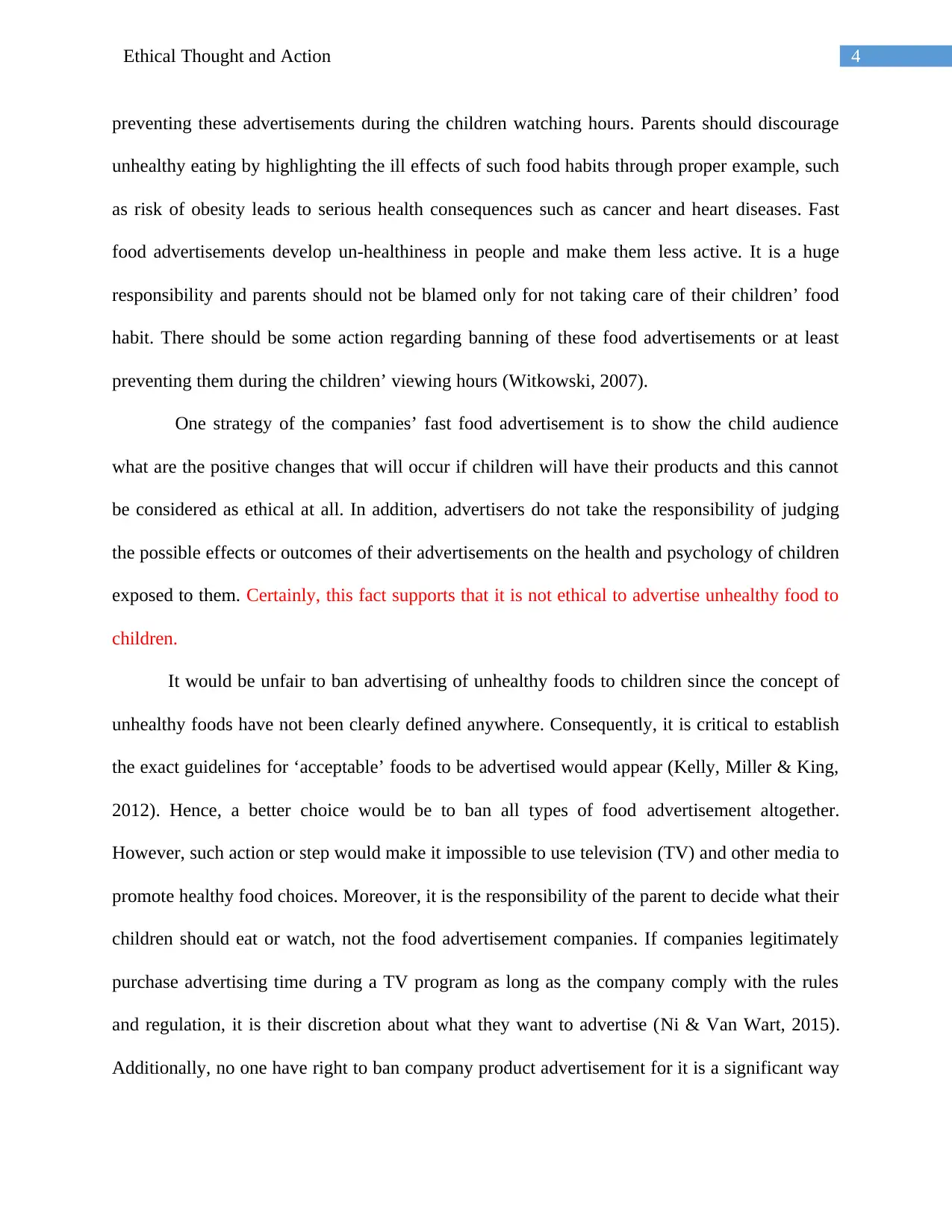
4Ethical Thought and Action
preventing these advertisements during the children watching hours. Parents should discourage
unhealthy eating by highlighting the ill effects of such food habits through proper example, such
as risk of obesity leads to serious health consequences such as cancer and heart diseases. Fast
food advertisements develop un-healthiness in people and make them less active. It is a huge
responsibility and parents should not be blamed only for not taking care of their children’ food
habit. There should be some action regarding banning of these food advertisements or at least
preventing them during the children’ viewing hours (Witkowski, 2007).
One strategy of the companies’ fast food advertisement is to show the child audience
what are the positive changes that will occur if children will have their products and this cannot
be considered as ethical at all. In addition, advertisers do not take the responsibility of judging
the possible effects or outcomes of their advertisements on the health and psychology of children
exposed to them. Certainly, this fact supports that it is not ethical to advertise unhealthy food to
children.
It would be unfair to ban advertising of unhealthy foods to children since the concept of
unhealthy foods have not been clearly defined anywhere. Consequently, it is critical to establish
the exact guidelines for ‘acceptable’ foods to be advertised would appear (Kelly, Miller & King,
2012). Hence, a better choice would be to ban all types of food advertisement altogether.
However, such action or step would make it impossible to use television (TV) and other media to
promote healthy food choices. Moreover, it is the responsibility of the parent to decide what their
children should eat or watch, not the food advertisement companies. If companies legitimately
purchase advertising time during a TV program as long as the company comply with the rules
and regulation, it is their discretion about what they want to advertise (Ni & Van Wart, 2015).
Additionally, no one have right to ban company product advertisement for it is a significant way
preventing these advertisements during the children watching hours. Parents should discourage
unhealthy eating by highlighting the ill effects of such food habits through proper example, such
as risk of obesity leads to serious health consequences such as cancer and heart diseases. Fast
food advertisements develop un-healthiness in people and make them less active. It is a huge
responsibility and parents should not be blamed only for not taking care of their children’ food
habit. There should be some action regarding banning of these food advertisements or at least
preventing them during the children’ viewing hours (Witkowski, 2007).
One strategy of the companies’ fast food advertisement is to show the child audience
what are the positive changes that will occur if children will have their products and this cannot
be considered as ethical at all. In addition, advertisers do not take the responsibility of judging
the possible effects or outcomes of their advertisements on the health and psychology of children
exposed to them. Certainly, this fact supports that it is not ethical to advertise unhealthy food to
children.
It would be unfair to ban advertising of unhealthy foods to children since the concept of
unhealthy foods have not been clearly defined anywhere. Consequently, it is critical to establish
the exact guidelines for ‘acceptable’ foods to be advertised would appear (Kelly, Miller & King,
2012). Hence, a better choice would be to ban all types of food advertisement altogether.
However, such action or step would make it impossible to use television (TV) and other media to
promote healthy food choices. Moreover, it is the responsibility of the parent to decide what their
children should eat or watch, not the food advertisement companies. If companies legitimately
purchase advertising time during a TV program as long as the company comply with the rules
and regulation, it is their discretion about what they want to advertise (Ni & Van Wart, 2015).
Additionally, no one have right to ban company product advertisement for it is a significant way
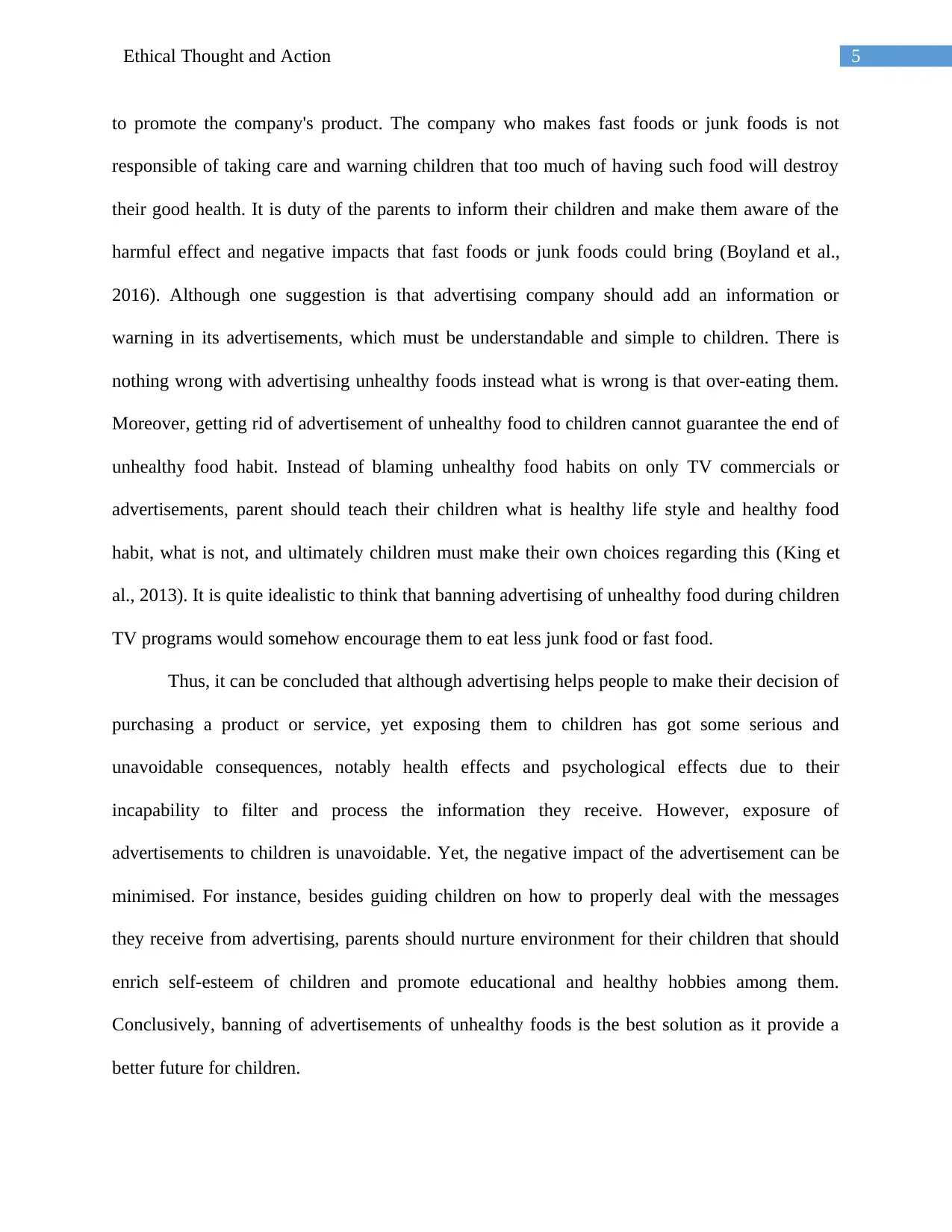
5Ethical Thought and Action
to promote the company's product. The company who makes fast foods or junk foods is not
responsible of taking care and warning children that too much of having such food will destroy
their good health. It is duty of the parents to inform their children and make them aware of the
harmful effect and negative impacts that fast foods or junk foods could bring (Boyland et al.,
2016). Although one suggestion is that advertising company should add an information or
warning in its advertisements, which must be understandable and simple to children. There is
nothing wrong with advertising unhealthy foods instead what is wrong is that over-eating them.
Moreover, getting rid of advertisement of unhealthy food to children cannot guarantee the end of
unhealthy food habit. Instead of blaming unhealthy food habits on only TV commercials or
advertisements, parent should teach their children what is healthy life style and healthy food
habit, what is not, and ultimately children must make their own choices regarding this (King et
al., 2013). It is quite idealistic to think that banning advertising of unhealthy food during children
TV programs would somehow encourage them to eat less junk food or fast food.
Thus, it can be concluded that although advertising helps people to make their decision of
purchasing a product or service, yet exposing them to children has got some serious and
unavoidable consequences, notably health effects and psychological effects due to their
incapability to filter and process the information they receive. However, exposure of
advertisements to children is unavoidable. Yet, the negative impact of the advertisement can be
minimised. For instance, besides guiding children on how to properly deal with the messages
they receive from advertising, parents should nurture environment for their children that should
enrich self-esteem of children and promote educational and healthy hobbies among them.
Conclusively, banning of advertisements of unhealthy foods is the best solution as it provide a
better future for children.
to promote the company's product. The company who makes fast foods or junk foods is not
responsible of taking care and warning children that too much of having such food will destroy
their good health. It is duty of the parents to inform their children and make them aware of the
harmful effect and negative impacts that fast foods or junk foods could bring (Boyland et al.,
2016). Although one suggestion is that advertising company should add an information or
warning in its advertisements, which must be understandable and simple to children. There is
nothing wrong with advertising unhealthy foods instead what is wrong is that over-eating them.
Moreover, getting rid of advertisement of unhealthy food to children cannot guarantee the end of
unhealthy food habit. Instead of blaming unhealthy food habits on only TV commercials or
advertisements, parent should teach their children what is healthy life style and healthy food
habit, what is not, and ultimately children must make their own choices regarding this (King et
al., 2013). It is quite idealistic to think that banning advertising of unhealthy food during children
TV programs would somehow encourage them to eat less junk food or fast food.
Thus, it can be concluded that although advertising helps people to make their decision of
purchasing a product or service, yet exposing them to children has got some serious and
unavoidable consequences, notably health effects and psychological effects due to their
incapability to filter and process the information they receive. However, exposure of
advertisements to children is unavoidable. Yet, the negative impact of the advertisement can be
minimised. For instance, besides guiding children on how to properly deal with the messages
they receive from advertising, parents should nurture environment for their children that should
enrich self-esteem of children and promote educational and healthy hobbies among them.
Conclusively, banning of advertisements of unhealthy foods is the best solution as it provide a
better future for children.
⊘ This is a preview!⊘
Do you want full access?
Subscribe today to unlock all pages.

Trusted by 1+ million students worldwide
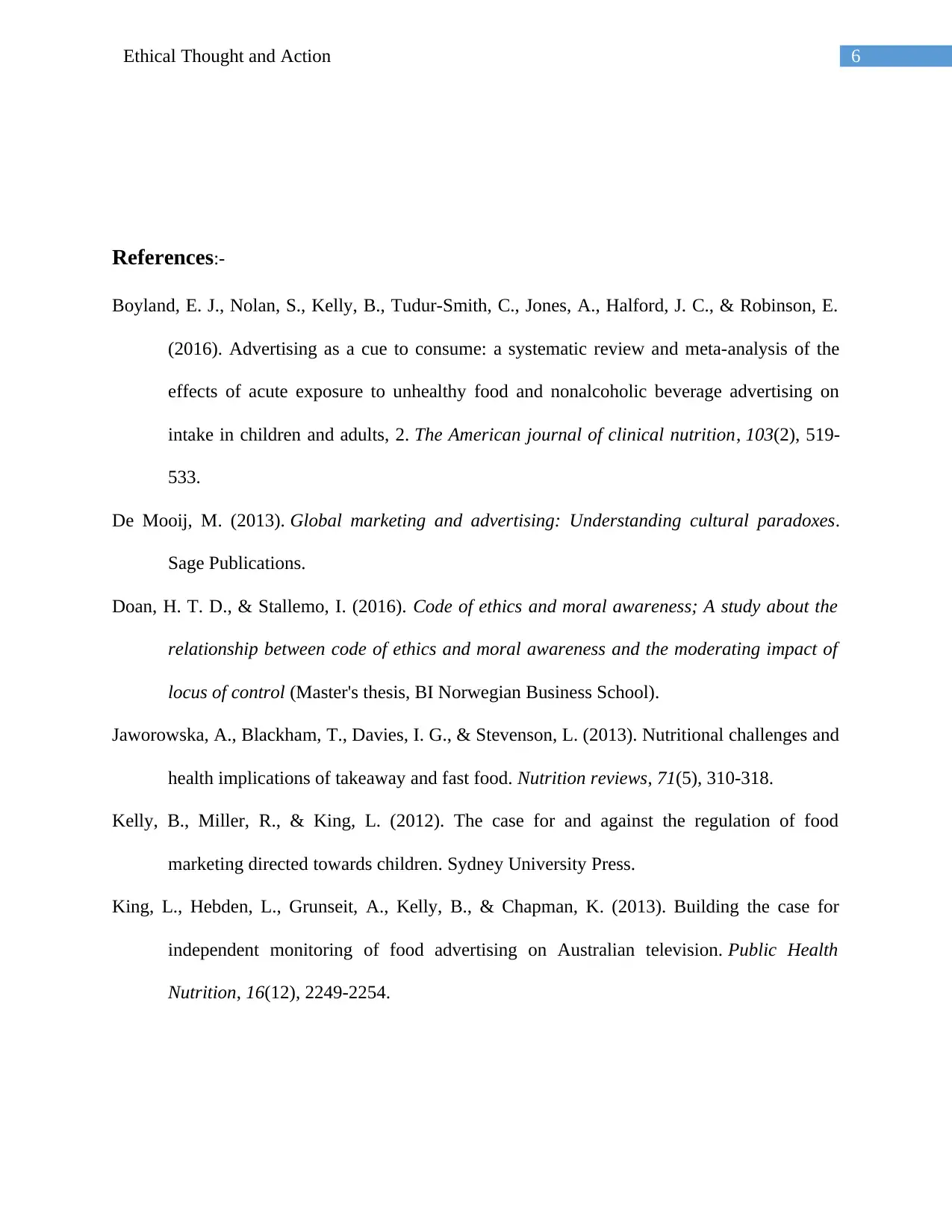
6Ethical Thought and Action
References:-
Boyland, E. J., Nolan, S., Kelly, B., Tudur-Smith, C., Jones, A., Halford, J. C., & Robinson, E.
(2016). Advertising as a cue to consume: a systematic review and meta-analysis of the
effects of acute exposure to unhealthy food and nonalcoholic beverage advertising on
intake in children and adults, 2. The American journal of clinical nutrition, 103(2), 519-
533.
De Mooij, M. (2013). Global marketing and advertising: Understanding cultural paradoxes.
Sage Publications.
Doan, H. T. D., & Stallemo, I. (2016). Code of ethics and moral awareness; A study about the
relationship between code of ethics and moral awareness and the moderating impact of
locus of control (Master's thesis, BI Norwegian Business School).
Jaworowska, A., Blackham, T., Davies, I. G., & Stevenson, L. (2013). Nutritional challenges and
health implications of takeaway and fast food. Nutrition reviews, 71(5), 310-318.
Kelly, B., Miller, R., & King, L. (2012). The case for and against the regulation of food
marketing directed towards children. Sydney University Press.
King, L., Hebden, L., Grunseit, A., Kelly, B., & Chapman, K. (2013). Building the case for
independent monitoring of food advertising on Australian television. Public Health
Nutrition, 16(12), 2249-2254.
References:-
Boyland, E. J., Nolan, S., Kelly, B., Tudur-Smith, C., Jones, A., Halford, J. C., & Robinson, E.
(2016). Advertising as a cue to consume: a systematic review and meta-analysis of the
effects of acute exposure to unhealthy food and nonalcoholic beverage advertising on
intake in children and adults, 2. The American journal of clinical nutrition, 103(2), 519-
533.
De Mooij, M. (2013). Global marketing and advertising: Understanding cultural paradoxes.
Sage Publications.
Doan, H. T. D., & Stallemo, I. (2016). Code of ethics and moral awareness; A study about the
relationship between code of ethics and moral awareness and the moderating impact of
locus of control (Master's thesis, BI Norwegian Business School).
Jaworowska, A., Blackham, T., Davies, I. G., & Stevenson, L. (2013). Nutritional challenges and
health implications of takeaway and fast food. Nutrition reviews, 71(5), 310-318.
Kelly, B., Miller, R., & King, L. (2012). The case for and against the regulation of food
marketing directed towards children. Sydney University Press.
King, L., Hebden, L., Grunseit, A., Kelly, B., & Chapman, K. (2013). Building the case for
independent monitoring of food advertising on Australian television. Public Health
Nutrition, 16(12), 2249-2254.
Paraphrase This Document
Need a fresh take? Get an instant paraphrase of this document with our AI Paraphraser
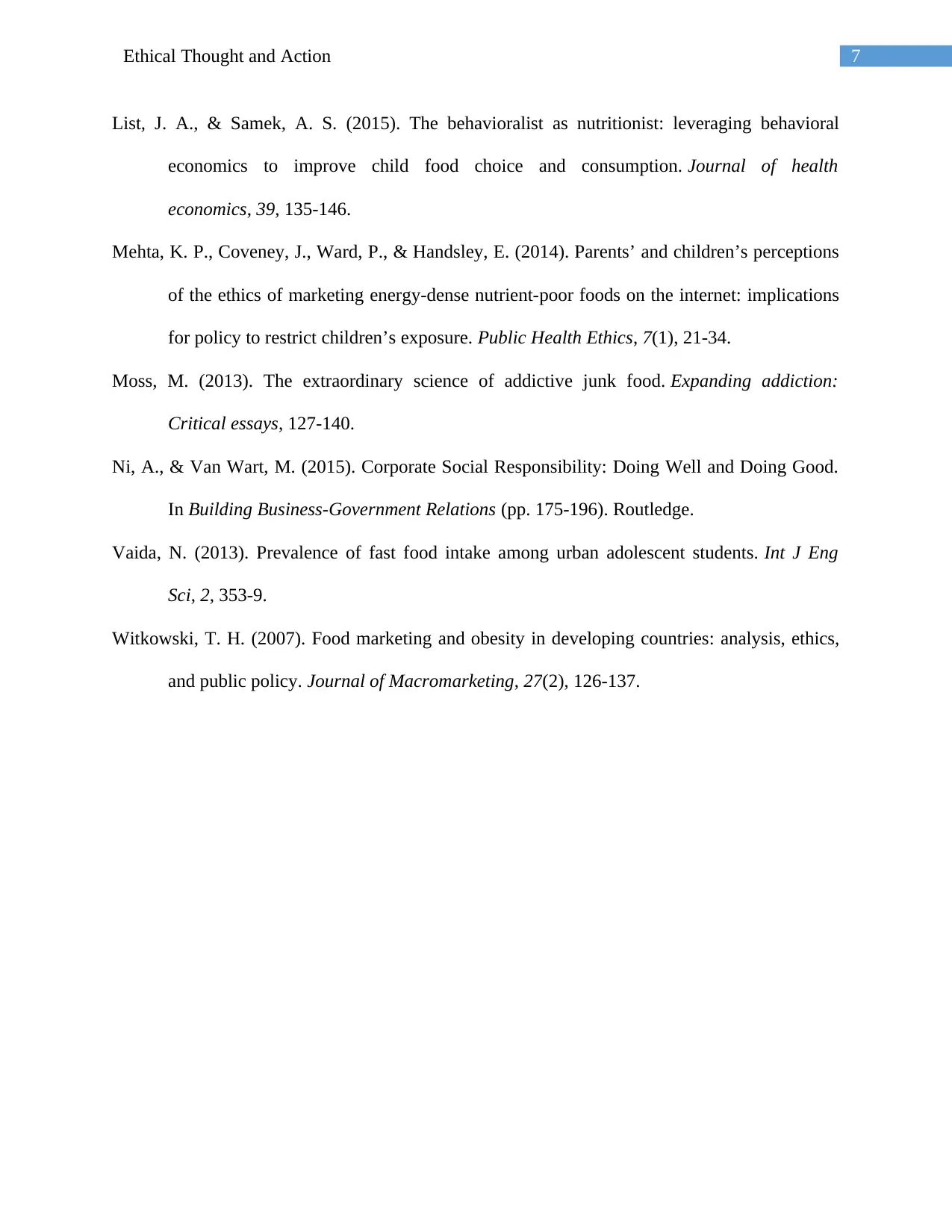
7Ethical Thought and Action
List, J. A., & Samek, A. S. (2015). The behavioralist as nutritionist: leveraging behavioral
economics to improve child food choice and consumption. Journal of health
economics, 39, 135-146.
Mehta, K. P., Coveney, J., Ward, P., & Handsley, E. (2014). Parents’ and children’s perceptions
of the ethics of marketing energy-dense nutrient-poor foods on the internet: implications
for policy to restrict children’s exposure. Public Health Ethics, 7(1), 21-34.
Moss, M. (2013). The extraordinary science of addictive junk food. Expanding addiction:
Critical essays, 127-140.
Ni, A., & Van Wart, M. (2015). Corporate Social Responsibility: Doing Well and Doing Good.
In Building Business-Government Relations (pp. 175-196). Routledge.
Vaida, N. (2013). Prevalence of fast food intake among urban adolescent students. Int J Eng
Sci, 2, 353-9.
Witkowski, T. H. (2007). Food marketing and obesity in developing countries: analysis, ethics,
and public policy. Journal of Macromarketing, 27(2), 126-137.
List, J. A., & Samek, A. S. (2015). The behavioralist as nutritionist: leveraging behavioral
economics to improve child food choice and consumption. Journal of health
economics, 39, 135-146.
Mehta, K. P., Coveney, J., Ward, P., & Handsley, E. (2014). Parents’ and children’s perceptions
of the ethics of marketing energy-dense nutrient-poor foods on the internet: implications
for policy to restrict children’s exposure. Public Health Ethics, 7(1), 21-34.
Moss, M. (2013). The extraordinary science of addictive junk food. Expanding addiction:
Critical essays, 127-140.
Ni, A., & Van Wart, M. (2015). Corporate Social Responsibility: Doing Well and Doing Good.
In Building Business-Government Relations (pp. 175-196). Routledge.
Vaida, N. (2013). Prevalence of fast food intake among urban adolescent students. Int J Eng
Sci, 2, 353-9.
Witkowski, T. H. (2007). Food marketing and obesity in developing countries: analysis, ethics,
and public policy. Journal of Macromarketing, 27(2), 126-137.
1 out of 8
Related Documents
Your All-in-One AI-Powered Toolkit for Academic Success.
+13062052269
info@desklib.com
Available 24*7 on WhatsApp / Email
![[object Object]](/_next/static/media/star-bottom.7253800d.svg)
Unlock your academic potential
Copyright © 2020–2026 A2Z Services. All Rights Reserved. Developed and managed by ZUCOL.





